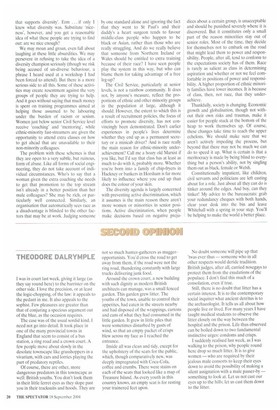SECOND OPINION
THEODORE DALRYMPLE
I was in court last week, giving it large (as they say round here) to the barrister on the other side. I love the precision, or at least the logic-chopping, of the law: it appeals to the pedant in me. It also appeals to the sophist. Few pleasures are greater than that of conjuring a specious argument out of the blue, as the occasion requires.
The case was of the usual sordid kind, I need not go into detail. It took place in one of the many provincial towns in England that seem to consist of a bus station, a ring road and a crown court. A few people move about slowly in the desolate townscape like grasshoppers in a vivarium, with cars and lorries playing the part of predatory reptiles.
Of course, there are other, more dangerous predators in this townscape as well: British youths. You don't look them in their little ferret eyes as they slope past you in their tracksuits and hoods. They are not so much hunter-gatherers as muggeropportunists. You'd cross the road to get away from them, if the road were not the ring road, thundering constantly with large trucks delivering junk food.
Around the crown court, a new building with such dignity as modern British architects can manage, was a small fenced garden. This garden grew litter. The youths of the town, unable to control their appetites, had eaten in the streets nearby and had disposed of the wrappings, cartons and cans of what they had consumed in the little garden. It grew in little piles that were sometimes disturbed by gusts of wind, so that an empty packet of crisps blew across my face as I reached the entrance.
Inside all was clean and tidy, except for the upholstery of the seats for the public, which, though comparatively new, was deeply impregnated with Coca-Cola, coffee and crumbs. There were stains on each of the seats that looked like a map of Treasure Island. As every youth in this country knows, an empty seat is for resting your trainered feet upon. No doubt someone will pipe up that 'twas ever thus — someone who in all other respects would deride tradition. British judges, after all, carried nosegays to protect them from the exudations of the populace. I don't find this much of a consolation, even if true.
Still, there is no doubt that litter has a certain interest. It is to the contemporary social inquirer what ancient detritus is to the archaeologist. It tells us all about how people live or lived. For many years I have taught medical students to observe the litter closely on the way between the hospital and the prison. Life thus observed can be boiled down to two fundamental instinctive urges: condoms and crisps.
I suddenly realised last week, as I was walking to the prison, why people round here drop so much litter. It is to give women — who are required by their jealous male consorts to keep their eyes down to avoid the possibility of making a silent assignation with a male passer-by — something to look at. Let us not cast our eyes up to the hills; let us cast them down to the litter.


















































































 Previous page
Previous page